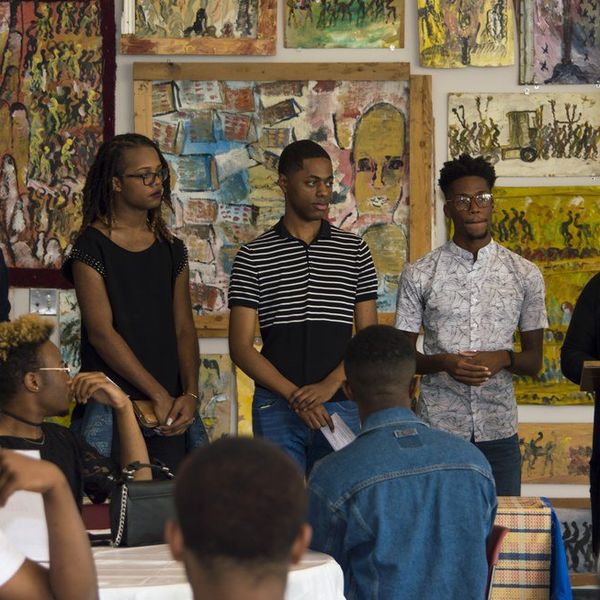The phrase "safe space" has become a buzzword at educational institutions for the past few decades as an effort to cultivate zones of acceptance for members of marginalized groups. A “safe space” is a place where anyone can relax and be able to fully express themselves, without fear of being made to feel uncomfortable or unsafe on account of how they identify or previous trauma they have experienced. Fostering these communities is important for marginalized people, but quite frankly the collegiate millennials of this country have taken the "safe space" too far.
Instead of the "safe space" being used for people who are recovering from serious trauma, the term is being thrown around as a movement to scrub our universities clean of words, ideas and subjects that might cause any level of discomfort or offense. The "safe space" has been adapted by many schools to fit the needs of privileged students, who want to create hypersensitive bubbles that have zero-tolerance of any controversial opinions.
Universities are required by two civil-rights statutes, Title VII and Title IX, to ensure that their campuses don’t create a “hostile environment” for women and other groups subject to harassment. However, universities are not supposed to go too far in suppressing free speech. If officials don’t censure or don’t prevent speech that may inflict psychological damage on a member of a protected class, they risk fostering a hostile environment and prompting an investigation. As a result, students who say they feel unsafe are more likely to be heard than students who demand censorship on other grounds.
Many claim that making spaces safer is about learning how to be kind to each other, but kindness alone won’t allow us to gain better insight on the real issues at stake. If the point of a “safe space” is therapy for people who feel victimized by traumatization, that sounds like a great mission. But this has begun to infiltrate classrooms making both professors and students loath to say anything that might hurt someone’s feelings. It is difficult to have a therapeutic space that’s also an intellectual space.
The current movement claims to promote emotional well-being and free speech, yet seeks to punish anyone who interferes with its aim, even accidentally. This creates a culture where everyone must think twice before speaking up, lest they face charges of insensitivity, aggression, or worse. It's hard not to see the mechanism of privilege at work. These students are taking on decades worth of debt, or spending 15 times the median income on their college education — why shouldn't they demand that adjunct professors and guest speakers not offend them? This ultimately is a detriment to their over-all costly education as a greater diversity of opinion is being pushed out of universities.
This new climate is slowly being institutionalized, and is affecting what can be said in the classroom, even as a basis for discussion. During the 2014–15 school year the deans and department chairs at the 10 University of California system schools were presented by administrators at faculty leader-training sessions with examples of microaggressions. The list of offensive statements included: “America is the land of opportunity” and “I believe the most qualified person should get the job.”
At institutions of higher learning, students should be able to distinguish between racist speech and speech about racism, homophobic slurs and discussion of homophobia, between threats of sexual assault and debate of sexual assault. The very people who need to be a part of these crucial discussions are the ones hiding in their "safe spaces" when their voices need to be heard the most to bring about long-term social change on difficult and controversial topics.
It must be noted that to people who have experienced real trauma -- violent crimes, violence due to race, rape, the loss of loved one – having a place to recover is crucial. It is perfectly understandable that a victim of rape would want to avoid a heated discussion on rape statistics. Their struggles should not be devalued or disregarded, but it must be duly noted that long-term healing means strengthening oneself mentally to face these subjects in the future.
"I agree that safe spaces are a detriment to intellectual and personal growth at the collegiate level" says sophomore Genny Dyer from Wheelock College in Boston. "In my environment, the term 'brave space' has been coined recently in lieu of "safe space" because there's an argument that a certain level of discomfort in the learning environment is necessary for true growth to occur. However, I think there is a limit to how much discomfort you should be feeling in the learning environment, so I think it's important to listen to yourself and find that happy medium between being emotionally comfortable and feeling too much discomfort."
It might be time to step back, give "safe space" some closure, and bring in the “brave space.” We cannot expect society to shield every person from controversial and possibly harmful statements; people must be able to acquire the knowledge to create those spaces for themselves. This knowledge of how the real world works starts at the collegiate level. We can foster critical thinking in our institutions, in part by encouraging students to question their own unexamined beliefs, as well as the received wisdom of those around them. Such questioning sometimes leads to discomfort and anger, but ultimately leads the way to understanding.





















